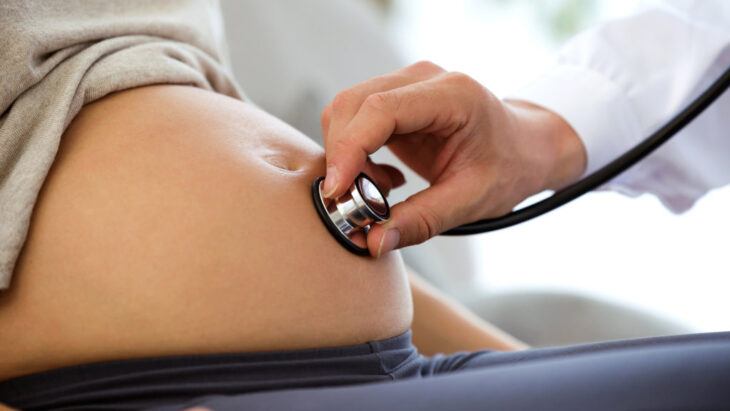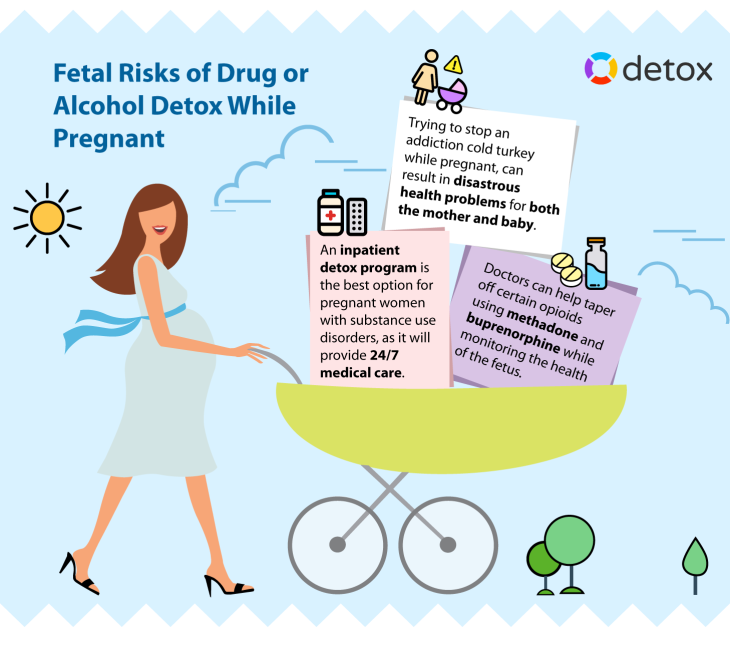Detox While Pregnant: Risks, Safe Options and Support for Moms-to-Be

Pregnancy is often one of the most exciting and hopeful times in a woman’s life, filled with wishes for the future and optimism about what lies ahead.
However, for moms to be with alcohol or substance use disorder, this joyful period can also bring about feelings of fear and uncertainty, knowing that they will face some of the toughest challenges in their lives. Reaching out for detox white pregnant women can make the transition to motherhood a safer, happier and healthier journey.
According to the National Institute on Drug Abuse, approximately 5% of all pregnant women will use one or more addictive substances during their pregnancy. Seeking medically supported care and detox while pregnant is not only beneficial for mom and baby but is also one of the bravest acts a woman can do.
Understanding the Risks: Substance Use During Pregnancy
The placenta is the lifeline between the mother and baby, supplying oxygen and nutrition and removing waste products that enable the baby to grow in a healthy environment.
Because the placenta acts as an exchange center, alcohol and other substances, including nicotine, THC and other drugs of abuse that the mother consumes, can be transmitted to the baby.
Occasional or regular use of these substances at any time while pregnant can put the pregnancy at risk and cause long-term problems for the baby.
For this reason, medical professionals advise that pregnant women abstain from the use of any substances that can cause harm to the baby and seek medically supported treatment, including detox, for the best outcomes.
Most Common Substances Used During Pregnancy
An article published by the National Library of Medicine in 2023 reported that the most commonly abused substances in pregnant women were tobacco, alcohol and marijuana, followed by cocaine and opioids. Each of these substances is known to have adverse impacts on both the pregnancy and the baby.
Tobacco
Tobacco use during pregnancy has been associated with an increased risk of miscarriage, low birth weight, premature birth, birth defects of the mouth and lip, brain and lung damage and sudden infant death syndrome (SIDS).
This goes beyond smoking the traditional nicotine-containing cigarettes to electric cigarettes and vapes as well. When a mother smokes, the nicotine is passed to the baby via the placenta, resulting in decreased levels of oxygen and increased levels of nicotine in the baby.
Alcohol
Alcohol use during pregnancy has been associated with increased risk of miscarriage and stillbirth and can result in a variety of conditions referred to as fetal alcohol spectrum disorders (FASD).
Babies with FASD face long-term cognitive, behavioral and developmental disabilities as well as an increased risk of birth defects that can include vision or hearing problems and conditions that impact the heart, brain or kidneys.

Marijuana
Marijuana use during pregnancy has increased among pregnant women in part due to the legalization of recreational or medical marijuana.
Research findings suggest marijuana use can lead to low birth weight due to elevated levels of carbon dioxide, an increased risk of premature birth due to long term use and the potential for the development of hyperactivity disorders in children.
Opioids
Opioid abuse during pregnancy has been associated with adverse outcomes, including poor fetal development and growth, an increased risk of premature and stillbirth and some birth defects.
It also poses the risk of the infant developing neonatal abstinence syndrome (NAS), which has been associated with negative impacts on the baby’s central nervous system, gastrointestinal system and long-term developmental progress.
Also concerning are the findings that suggest that maternal death is increased due to opioid use, with overdose being one of the top causes of maternal mortality.
Stimulants
Stimulant use while pregnant can carry significant risk for the mom and baby. The use of drugs such as cocaine or methamphetamines has been shown to increase the risk of premature rupture of membranes, which can lead to an increased risk of infection or premature birth, spontaneous miscarriage or placental abruption.
This is when the placental lining separates from the uterus, leading to a potentially life threatening state for mom and baby.
Studies have also shown that the use of stimulants during pregnancy increases a woman’s chances of developing gestational hypertension and preeclampsia, both potentially fatal conditions.
Benzodiazepines
Benzodiazepine use during pregnancy has been shown to cause withdrawal symptoms in infants, an increased risk of miscarriage and preterm birth and floppy infant syndrome.
Floppy infant syndrome causes low muscle tone, thermoregulation issues, lethargy, poor respiratory effort and feeding difficulties in babies exposed to benzodiazepines during pregnancy, especially when mothers use them in the third trimester.
The Danger of Quitting Cold Turkey While Pregnant
There is no question that pregnant mothers should abstain from alcohol and substance use during pregnancy.
However, for women facing dependence or addiction, going cold turkey while pregnant comes with significant risks to the pregnancy, the fetus and the mother. For this reason, medical professionals encourage the use of medically supported detox and treatment during pregnancy for the best outcomes.
Going cold turkey can not only result in some uncomfortable withdrawal symptoms, but it can also cause serious outcomes, including:
| Alcohol | Opioids | Stimulants | Benzodiazepines |
| Delirium Tremens in the mother | Respiratory depression in the fetus | Severe depression in the mother | Hypertension in the mother |
| Seizure activity in the mother | Fetal distress | Cardiovascular stress that impacts both the mother and fetus | Seizure activity in the mother |
| Fetal distress | Increased risk of overdose in the mother- increased maternal mortality | Fetal distress | Fetal distress |
When & Why to Seek Detox During Pregnancy
Seeking detox is not a sign of weakness. It indicates that not only is the mother ready to address her addiction, but that she wants to protect her pregnancy and baby as well.
When should a pregnant woman seek detox? The earlier a mother undergoes the detoxification process, the better the outcome is for both of them.
Medical professionals strongly encourage a controlled and safe environment where moms can get the support and intervention they need to safely undergo the process. This includes inpatient and outpatient detox programs where pregnant mothers receive the highest priority for admission.
The table below highlights the key considerations for each trimester:
| Trimester | Potential Risks | Precautions |
| 1st (Weeks 1-12) | Miscarriage, complications with organ development in the fetus, dehydration, nausea and vomiting for the mother | Medical support is extremely important to provide interventions such as intravenous fluids, antiemetics and nutrition supplementation, as well as monitoring for complications such as hemorrhaging or infection. Gentle tapering of the drug is important, especially opioids or benzodiazepines. |
| 2nd (Weeks 13-26) | Preterm labor, complications related to fetal growth and stress on developing organs | Medical support that closely monitors for complications. Interventions such as nutritional support and frequent growth measurements. |
| 3rd (Weeks 27-40) | Preterm labor, low birth weight and fetal distress. Detoxing in the last trimester versus earlier in the pregnancy increases the risk of the baby developing neonatal abstinence syndrome. | Close medical monitoring, support and intervention that includes fetal monitoring, medications to prevent dehydration and intravenous fluids to prevent dehydration |
Safe Detox Options for Pregnant Women
Many detox programs give priority admission for pregnant women to ensure they get access to the care they need as quickly as possible. These programs include inpatient or residential detox and outpatient detox programs that understand the importance of early intervention and monitoring for the best pregnancy outcomes.
A pregnant woman in detox will have an individualized treatment plan that includes medication assisted treatment when indicated, a gradual tapering plan, close monitoring of fetal well being and growth and for any potential complications that can impact the health of the woman, the pregnancy or the fetus.
In addition to medical support, mothers in detox will receive behavioral and psychotherapies to help them develop healthy coping skills, address trauma and develop a relapse prevention plan.
Currently, methadone and buprenorphine are being used in pregnancy as a part of a medication assisted treatment plan for people with opioid use disorder. These drugs help to lower the severity of neonatal abstinence syndrome and shorten NICU stays.
Other medications can be used during the detox process, including nicotine replacement products and benzodiazepines, under strict medical supervision.
Choosing the Right Detox & Treatment Program
Some facilities offer specialized detox for pregnant women. Others offer detox and prenatal care. It’s important to know what to look for to determine which detox program is best for mom and baby.
What to Look For
Pregnant women should look for a program that integrates prenatal care into the treatment plan, provides co-occurring disorder treatment that focuses on conditions such as mental health and trauma and recognizes the unique challenges that women face in addiction.
Legal Protections & Barriers
Federal law gives pregnant women priority for admittance to public treatment programs.
State laws vary on reporting drug use during pregnancy, prosecution for drug use during pregnancy and guidelines for parental custody with drug use. It is important to know the laws in your state and work closely with medical providers and seek counsel to protect your rights.
What to Expect During & After Detox
The detox process is different for each individual and can be impacted by factors including the duration of use, amount of use, co-morbidity including physical and mental health conditions and one’s overall physical wellbeing.
Typically, it takes up to eight days to fully detox from alcohol, four to ten days for short-acting opioids, two weeks for benzodiazepines, three weeks or more for stimulants, three to four weeks for nicotine withdrawal and approximately three weeks for marijuana.
Pregnant detox should include close fetal monitoring, including fetal heart tones, ultrasounds or biophysical profiles. Mothers should have close monitoring of blood pressure and for physical changes, including swelling, vision changes and headaches that could indicate complications with the pregnancy.
As well, moms should participate in behavioral and psychotherapies and support groups that provide the help they need to build healthier relationships, address trauma and develop positive coping skills.
Frequently Asked Questions
Yes. Detox during pregnancy under close medical supervision is highly recommended for most drugs of abuse. However, it is recommended that pregnant women with opioid dependence be treated with buprenorphine or methadone.
Several medications are safe during pregnancy. Your medical professional will work with you to develop the best treatment plan possible. The most commonly used medications are methadone and buprenorphine.
An inpatient or outpatient detox program provides the safest way to detox while pregnant. Women receive close medical supervision and intervention, as well as behavioral or psychotherapy to help them on their recovery journey.
Yes. For some drugs, you can safely detox at any time during the pregnancy under close medical supervision and support. If you have been using opioids, your doctor may recommend treatment with medication for the duration of your pregnancy.
Yes, although the process can be uncomfortable. However, medical support can help through the utilization of nicotine replacement products to make the process easier.
Yes. While uncomfortable, withdrawing from weed is not life-threatening, and continued use will have more of a negative impact on the pregnancy and baby than detox. Medical supervision and support can make the process safer and easier.
Getting Help Now
Choosing to detox and get treatment can be one of the most important gifts a mother can give her baby. There are programs across the country that provide the specialized treatment that is needed to safely navigate this process.
This convenient database of facilities and programs can be filtered by levels of care, location, amenities, programs offered, insurance accepted and payment options. It also lists contact information on how to speak to an admissions person and get you on track for a brighter future.



